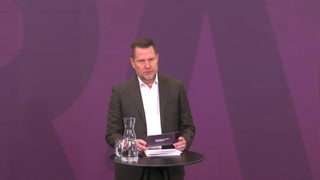Embracer reveals it laid off around 1,400 people in 6 months last year, but don't be a bellyacher—this is all about 'maximising shareholder value'
And there's more to come.

There may be a wider context of enormous industry layoffs, but the rate and volume of layoffs at Embracer Group over the last year is on an unprecedented scale. Everything seemed on an even keel until the collapse of a mystery $2 billion deal in May last year left its CEO gobsmacked (while the company's COO chose to fall on his sword) and resulted in what at the time was said to be a 5% cut to its global workforce, around 900 people.
The axe kept falling over the course of the year, with some studios closed outright, while the dire warnings about "restructuring" from the suits continued. And just to rub it in for readers of PC Gamer in particular, Embracer even laid off almost 100 staff at Crystal Dynamics and cancelled a Deus Ex game.
I have to say, Embracer hasn't exactly presented the greatest public face through all this. The first thing CEO Lars Wingefors said when the deal collapsed was to call it "a rough night", while its Chief Strategy Officer Phil Rogers later said the layoffs were "necessary" and it had made "good progress". Business is business, of course, and these layoffs may well have been inevitable: but it's always good to remember these are actual human beings losing their livelihood overnight. Especially if you're the one laying them off.
That slightly callous tone has continued in Embracer's Q3 financial report, which reveals that over Q2 and Q3 combined it has laid off 904 and 485 people respectively. That's 1,387 staff in six months, or around 8% of its workforce.
Despite this, Embracer says it's unlikely to hit its target of getting its net debt under SEK 8 billion ($765.2 million) by the end of FY 2024. Then it goes on to further discuss reducing capital expenditure (capex), ie reducing its assets, and comes out with this stunner:
"Embracer still has a few larger structured divestment processes ongoing that could strengthen our balance sheet and further reduce capex. Processes are in mature stages. Certain companies might initiate restructuring before any divestment is announced. Our overruling principle is to always maximize shareholder value in any given situation."
Embracer says these debt reductions will come through various divestments, so essentially selling studios or IP as well as more job cuts, referencing various negotiations that are at "mature stages". That's why the second sentence in the above paragraph, "Certain companies might initiate restructuring before any divestment", is rather worrying: in plain English, this suggests it may strip studios to the bone before flogging them.
PC Gamer Newsletter
Sign up to get the best content of the week, and great gaming deals, as picked by the editors.
But it's that "maximise shareholder value" line that's the killer. Obviously this is a financial report written for shareholders, so this is playing to the crowd a little, but… maybe in this exact specific context you could not?
Amazingly enough, the report then goes on to say the layoffs are being "carried out with compassion, respect and integrity towards those affected." Sure.
More happy news for shareholders was a year-on-year increase of 4% in net sales to $1.157 billion, and net income of $210 million. The Q3 report ends by saying:
"With the actions that we are now taking, we are creating a strong foundation for the future, with an improved financial profile, and a more streamlined structure, while leveraging the potential of our diversified portfolio."
As for the actual games, and the studios themselves, Wingefors says Embracer's been shutting down the studios that were pulling down its "weighted average [return on investment to] around 2.2x", with the target being a ROI of 3.2x. It's going to be "considerably more selective" about the games it publishes, and you can probably guess the next part: will focus on "established, owned IPs and studios which we are confident will generate better predictability as well as increased ROI and profitability". All aboard the sequel train!
CEO Lars Wingefors throws words like "leaner, stronger" and "streamlined" around, though you do wonder where the layoffs are going to end with the Swedish conglomerate. Current events follow on from years when it was one of the industry's most voracious and acquisitive investors, but the fact that the collapse of one deal (albeit a gigantic one) has caused the company such enormous trouble suggests it wasn't on the soundest of strategic footings to begin with.
Rich is a games journalist with 15 years' experience, beginning his career on Edge magazine before working for a wide range of outlets, including Ars Technica, Eurogamer, GamesRadar+, Gamespot, the Guardian, IGN, the New Statesman, Polygon, and Vice. He was the editor of Kotaku UK, the UK arm of Kotaku, for three years before joining PC Gamer. He is the author of a Brief History of Video Games, a full history of the medium, which the Midwest Book Review described as "[a] must-read for serious minded game historians and curious video game connoisseurs alike."
Most Popular




